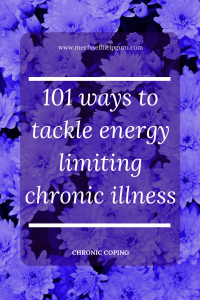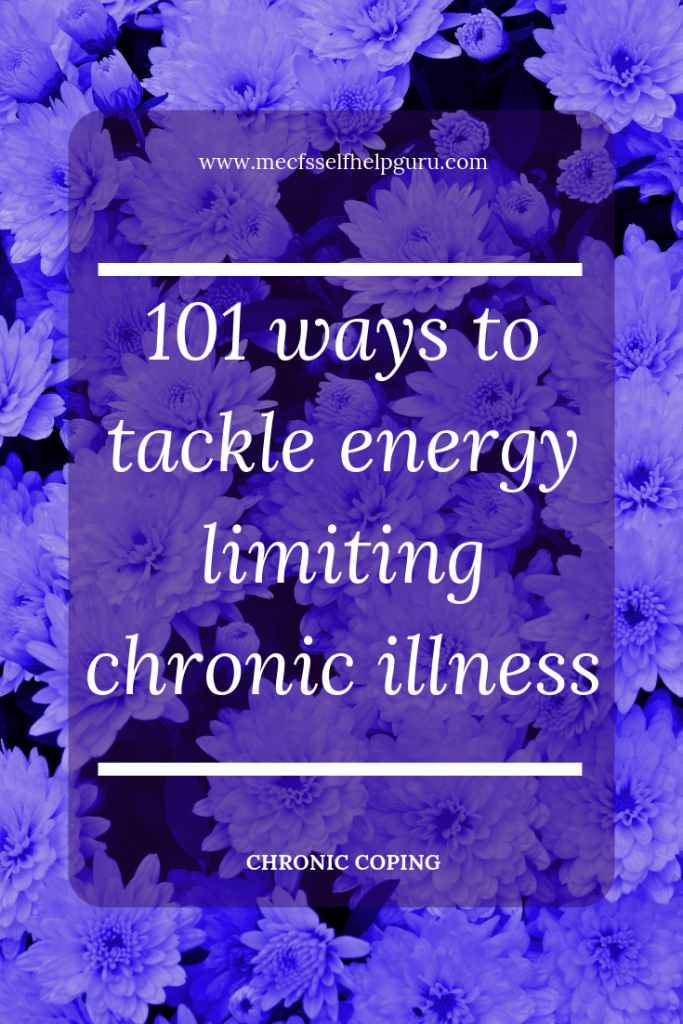This is a post I wrote especially for ProHealth’s Inspirational Corner and first appeared there about 6 weeks ago.
There are many, many ways we can help ourselves when we have illnesses like ME/CFS, Fibromyalgia and Lyme disease. Many of them are small simple steps, that may not have a huge impact in themselves but put together they can make a big difference to well-being. Although I haven’t quite reached full recovery again this time round, I’ve found that the steps I routinely take have led to a really good level of general functioning most of the time. Most of these steps I’ve had to build in to my routine one at a time and some are just things I do occasionally, but having so many things that I can do for myself feels empowering especially when there’s nobody out there to wave a magic wand. I hope you’ll find some inspiration from this list, if you do find things you’d like to add to your self-care, be kind to yourself and build things up one at a time. Ask your intuition to guide you towards the most important next step for you!
I’ve found that to keep up motivation to do the things I do, it helps to have a reason for them; an understanding of how they are contributing to my well-being and to pay attention to the intention I have for each of them when I start to do it.
Morning routine
- Affirmations to help strengthen neural pathways of beliefs that will drive more adaptive behaviour and to send commands to my body chemistry about what I expect it to be working on
- Drinking 2 or 3 mugs of hot water with a slice of lemon in to rehydrate and detox
- Tai chi; gentle mindful movement to help unblock my energy channels, support flow in my lymphatic system and connect with a sense of oneness
- Morning meditation to engage the parasympathetic nervous system
I use different meditation practices on different days to serve different purposes
- Mindfulness meditations as a means of practising acceptance of what is
- Mindfulness meditations as a means of practising control over thought processes, improving my ability to choose instead of going along with automatic pilot behaviours that are no longer adaptive.
- Mindfulness meditations that enable me to let go of secondary symptoms and resistance
- Breathing exercises and visualisations for relaxation
- Healing visualisations
- Meditations that connect me with a sense of peace, love, joy and oneness
- Gratitude practices that prime me for noticing the little things and appreciating them in the moment
- Intention setting for the ways of being that will help me get the best out of the day
- Visualising the day going well
- Connecting with a sense that the universe will support my well-being and purpose
Food and nutrition
- A protein packed breakfast to help stabilise my blood sugar issues
- A colourful salad for lunch to include lots of antioxidants
- A balanced evening meal with lots of fresh vegetables and a small portion of a low GI carb
- A low carb, low GI diet in general to help stabilise blood sugar issues and support my gut issues
- Avoiding foods that aggravate my gut symptoms, it’s a very long list but generally, sugars (including most fruit), gluten, high lactose products, yeast and mushrooms.
- Good quality multivitamin and mineral supplement for optimal bioavailability of nutrients
- Mitochondrial support supplements to help with energy production
- Essential fatty acid supplements which serve a variety of purposes but specifically improve the quality of my sleep
- Gingko Biloba supplement that helps me with my word finding
- Supplements that support my gut health
- An essential oil supplement to support healthy cellular response and regeneration
- Intermittent fasting two days a week to stabilise blood sugar
- Keeping well hydrated to support detoxification and lymphatic function
Pacing tools
- Aiming for mindful relaxed effortlessness in all that I do: tension and effort use energy inefficiently and make noticing when it’s running out harder
- Recording activity and effort over time to get an idea of a baseline of sustainable activity
- Breaking activities into smaller chunks to give mitochondria of particular cells a better chance to recycle energy and not switch into the harmful emergency production mode
- Alternating activities that use different types of energy: e.g. taking a break from cognitive work with a little washing up. (gives different cells an opportunity to recycle ATP)
- Paying attention to effort as an indicator that energy is dipping and stopping when it does!
- Using a timer for energy intensive tasks
- Matching tasks to the kind of energy I have, e.g. I concentrate better first thing in the morning and am better able to do gentle exercise late afternoon
- Doing only what I feel like in any given moment, to use energy most efficiently and not waste it forcing myself to do things that don’t feel right at the time
- Pacing rest with gentle movement to support lymphatic functioning
- Mindfulness of the task completion complex, so that I don’t push to finish something when my energy is running out
- Mindfulness of the urge to rush, which uses energy inefficiently
- Letting go of the non-essential
Other energy management tools
- Mindfulness of indicators of a low energy day, e.g. heaviness in my body, a sore throat etc. Cutting back activities to a recuperation level when energy is below baseline
- 3 day, 10% rule: only increasing activity by 10% if I’ve been feeling well for at least 3 days consistently. Making sure that level of increase is sustainable by not increasing again for at least another 3 days etc.
- Quality rest periods as part of routine
- Afternoon Yoga and meditation give me an energy boost, releasing tension, unblocking my energy channels and engaging my parasympathetic nervous system.
- Gardening gives me a boost of energy
- Connecting with and appreciating nature gives me a boost of energy
- Donna Eden Energy exercises to improve the balance and flow of energy channels
Managing stress and overwhelm
- Mindfulness of hitting an adrenalin state (false energy, speedy thoughts etc.), to minimise damage and avoid overdoing things in a big way
- Taking regular stimulation breaks in a stimulating environment
- Having a list of single pointed focused calming distraction activities, to help bring down sympathetic nervous system activity and referring to it when overstimulated
- Distracting but calming reading material (for me it’s romance novels)
- Easy puzzles that engage my mind enough to stop it going around in circles but allows stimulation levels to drop (for me it’s easy to middle level sudokus)
- Understanding overwhelm means not having the resources to meet perceived demands and giving myself permission to step away and top up my resources.
- Writing down what you think you have to do and putting it to one side until you have more resources. Culling the list as soon as you’re feeling relaxed enough to concentrate.
- Diffusing relaxing and releasing essential oils
- Eating regularly to avoid blood sugar swings and how they contribute to feeling stress
- Awareness of hormonal influences and not attributing unnecessary meaning which just makes stress feel more real and intense
Managing Brain Fog
- Sense of humour, accepting that I’m going to do daft things when my brain isn’t working properly
- Pacing concentration activities and fitting them into the best time of day for me to be thinking
- Lots of lists to minimise what I have to store in my head
- Routines that trigger the next thing without having to think about it, e.g. preparing supplements whilst preparing a meal
- Flexible scheduling programmed into my calendar with phone reminders
- Stimulating essential oils to help me focus, and relaxing essential oils to help let go when my mind becomes overwhelmed
Managing emotions (minimising their energetic drain)
- Understanding that resisting emotions takes a lot of energy, aiming to accept them with compassion and allow them to flow
- Writing worries on a piece of paper to hold them safe for when I have enough energy to deal with them, being trustworthy in dealing with things one small step at a time as soon as I have enough energy
- Mindfulness of when I am ruminating over the past, accepting that it can’t be changed and choosing to let it go
- Recognising that comparisons don’t serve me and choosing to let them go
- Befriending unpleasant emotions that can be regular visitors such as frustration and disappointment. Acknowledging and accepting them, then choosing to pay attention to other things.
- Recognising that the low mood that accompanies a crash can be a result of altered brain chemistry, avoiding giving it extra meaning that deepens the intensity of despair. Making myself as comfortable as possible while I wait for the worst to pass
- Understanding the role the illness has to play in exaggerated emotions
- Recognising the opportunities in the challenges
- Positively reframing things that regularly get me down e.g. recognising the benefit of being clean, rather than resenting the energy involved in taking a shower.
- Having emotional first aid postcards to remind me of my coping skills when my energy is low and brain fog gets in the way
- Taking responsibility for my own happiness in the here and now
Here and Now low energy Happiness skills (When the now’s OK you don’t feel so compelled to push past your limits!)
- Keeping a gratitude and achievements journal, and noticing the essence of a happy life
- Recalibrating what counts as an achievement bearing in mind the load of the illness (The strong man puling a truck 100m is as amazing as a marathon runner running 26 miles)
- Appreciating the little things in life
- Valuing time spent with loved ones
- Practising skills to help keep me focused in the here and now
- Practising loving kindness to myself and others
- Finding ways of making sure I laugh every day (e.g. comedy on the TV)
- Holding an intention to be light-hearted and joyful
- Spending time doing creative things
- Appreciating opportunities for growth and learning
- Taking the initiative with my social life and inviting people to take part in social activities that suit my needs and limitations
- Cultivating trust that all is as it should be and all will work out well
Essential oils
- Sometimes because they are just something pleasant to pay attention to
- To help me relax and engage the parasympathetic nervous system
- To help lift my mood when I’m feeling down
- To help me process my feelings when they are feeling stuck
- To massage into stiff muscles and soothe pain
- To ease headaches
- To help fight airborne pathogens when someone in my household is sick
- To replace toxic cleaning products and toiletries
- To help boost my immune system
- To help sleep
Minimizing toxic overload
- Using environmentally friendly household products and toiletries
- Taking care with what I put in my body, including medications, supplements, food and drink
- Taking measures to minimise exposure to mould
Bedtime routine to promote better sleep
- Screens off at least an hour before bed
- Doing everything in the same order to create a system of triggers that prepare the body for sleep
- Gentle reading in low light to settle the mind down, ready to catch an early sleep wave.
This list goes to show that there is so much involved in dealing well with an energy limiting chronic illness! Why not make a list of all the things that you are doing for yourself to show yourself what a great job you are doing!
A small favour: I’d be very grateful if you could rate this post using the stars below the related posts. Thank you
Image courtesy of pixabay.com








Thankyou, most helpful